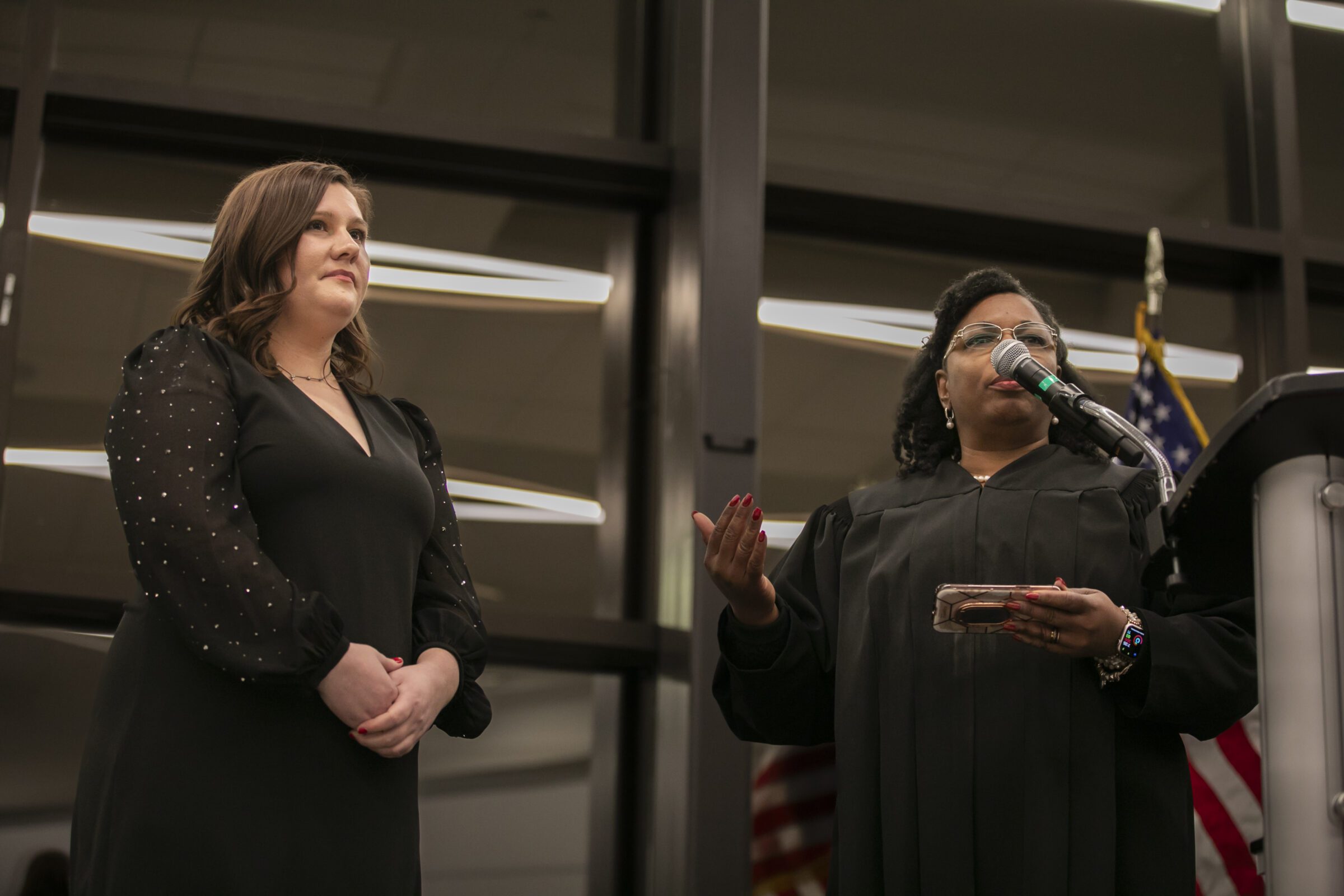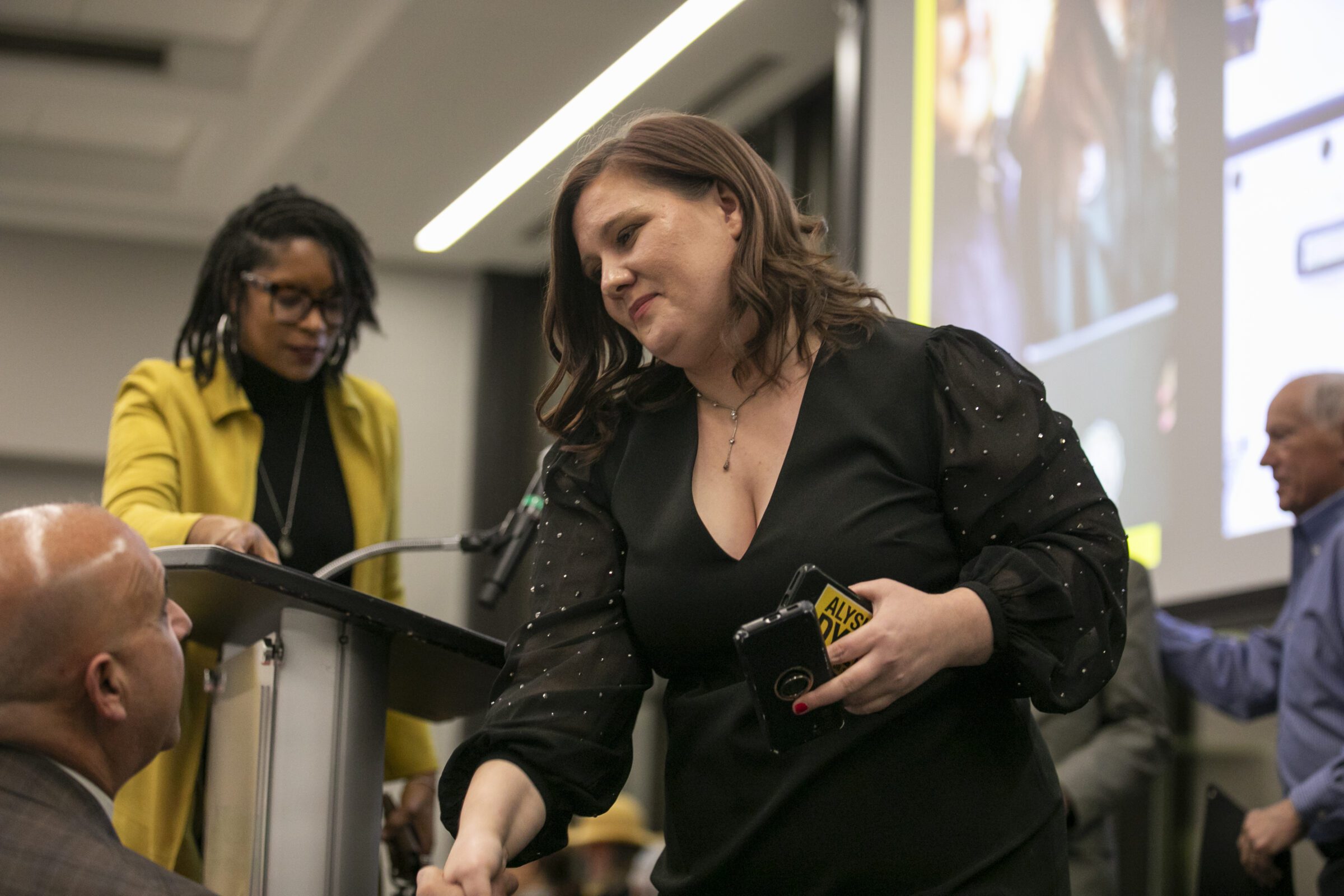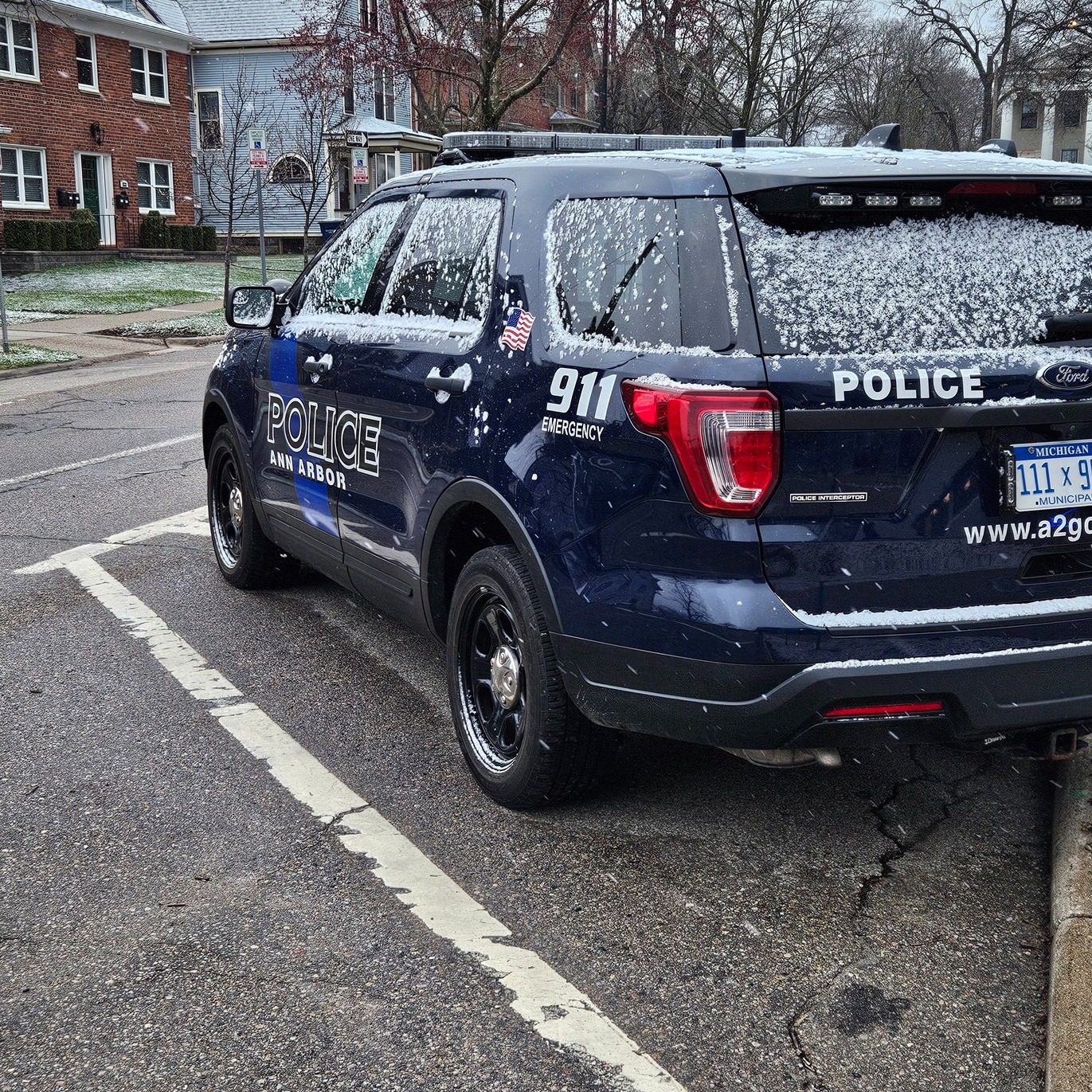A Michigan Sheriff and Prosecutor Join Forces to Implement Progressive Policy
Incoming Washtenaw County Sheriff Alyshia Dyer, a former social worker, plans to partner with Prosecutor Eli Savit to advance reforms that were siloed in different parts of the justice system.
| December 23, 2024

On Jan. 1, Alyshia Dyer will take office as sheriff of Washtenaw County, Michigan, an event that will mark the union of some strange bedfellows in the county’s criminal legal system: With Dyer at the helm, the county’s public safety strategies will soon be guided by an alliance between the top enforcers of the justice system and the grassroots reform groups who are often its toughest critics.
Dyer is a road patrol deputy-turned social worker who campaigned on a reform vision that includes trying to steer people away from the justice system rather than draw them into it. Her win in November is a culmination of prior wins by a coalition of reformers in the county that also brought progressives into the prosecutor’s office and courts.
Dyer has worked with these reformers to lay out plans to reduce unnecessary police encounters and arrests by limiting officers from making stops for certain low-level violations. She has pledged to address the stark racial disparities in traffic enforcement by ending quotas for traffic stops, and says arrests are the wrong tools for dealing with substance abuse and the opioid crisis: Her approach rejects the war on drugs and aims to steer people towards support rather than criminal punishment.
“Looking at the disparities involving drug arrests, there was a general understanding that we don’t want officers wasting their time,” Dyer told Bolts in an interview. “There is a frustration when officers are nickel and diming or getting involved in low-level things, and a frustration with pretext stops in general was resounding countywide.”
Dyer’s platform appealed broadly to voters in the liberal college town of Ann Arbor, as well as the surrounding rural areas where even many voters with more conservative values are fed up with the kind of policing that cycles people through the legal system without addressing their needs.
But to effectively carry out her plans, Dyer will also need allies in the justice system. She has at least one in Eli Savit, who was just reelected as Washtenaw’s Prosecuting Attorney after running unopposed. Savit first won office in 2020 at the height of the racial justice movement that swept through the country following the police killing of George Floyd. The movement helped give rise to a brand of progressive prosecutors including Savit, who embraced a less punitive approach that broke away from his tough-on-crime predecessor. His office took aim at the issue of racial profiling by announcing he would drop the charges in situations where officers use minor traffic violations as an excuse to search for drugs or other contraband. A slew of other policies offered leniency towards juveniles arrested on minor offenses, and declined charges for consensual sex work and certain low-level drug crimes — but those reforms can only make an impact after an arrest has already been made.
Now with Dyer as the county’s top cop and Savit as its lead prosecutor, they hope to move these reforms forward by working collaboratively on policies that were previously siloed in different parts of the justice system.
“What you see in Washtenaw is a lot of different partners in conjunction with the community are largely working towards the same goals and from the same playbook,” Savit said. “It reflects our community values. Ultimately, what people in Washtenaw want is for us to work together to get people on the right track, rather than cycling them through the justice system over and over again in an ineffective fashion.”
In November of 2020, Savit’s win was hailed as a success for the progressive prosecutor movement that for at least a decade has sought to reform local DA offices across the country. His policies gave reformers in Washtenaw an inroad for curbing the harm wrought on by excessive criminal punishment by deflecting some low-level arrests.
Savit regards his policy on pretextual stops — where minor traffic violations are used as an excuse to search cars for contraband — as a success. His office initially declined several of those cases, Savit told Bolts. But soon, police agencies across the county largely stopped sending those kinds of cases to his office. The approach later gained support in Ann Arbor, the county’s largest city, where the city council unanimously voted last year to limit police from stopping drivers for minor violations like cracked windshields or broken taillights that do not pose any risk to traffic safety.
Now with Dyer in office as well, organizers hope to stop even more of those arrests from happening in the first place.
“Our racial disparities in low level traffic stops are through the roof at the sheriff’s office,” Dyer told Bolts. “Regardless if the prosecutor decides to charge a case, the harm is still caused at the forefront. Avoiding those stops when possible, when it’s not a safety-related issue, is really important. There are so many instances where somebody has been pulled over, pulled out their car and searched. The police find nothing. They let them go, but the harm stays with that person.”
Like Dyer, Savit also embraced a legal strategy for addressing drugs that is focused on harm reduction and rehabilitation rather than punishment. His office decriminalized the possession and distribution of controlled medications like methadone and buprenorphine that are used to treat opioid addiction and curb fentanyl use. Like with the traffic stop arrests, very few of those cases now come across Savit’s desk. The remaining arrests for illegal possession of methadone or buprenorphine mostly come from people incarcerated in nearby prisons, and Savit’s office typically drops those cases, he said. Even though prosecutors rarely need to decline charges now, it is critical to have a public policy in place so the fear of criminal penalties will not deter people from accessing life saving medications, he said.
“Why on earth would we want to be discouraging somebody from using a medicine that we know is an alternative to using a dangerous drug that could kill them? We want less overdose deaths, not more. ” Savit told Bolts.

But a policy of non-enforcement is only effective if the entire criminal legal system is aligned across prosecutors and police, which isn’t the case for most places in the state. As Michigan has scaled up harm reduction initiatives in recent years—funded in part by payouts from pharmaceutical companies acquired through opioid settlements—the enforcement around controlled methadone and buprenorphine has been a patchwork across the state and even within Washtenaw County.
Dyer’s position—that criminal enforcement and arrests are the wrong way to address addiction issues—is rooted in her background as a social worker and therapist. She has advocated for unarmed community responders and public health outreach workers to deal with opioids, rather than police. And she plans to end internal quotas that encourage officers to make stops, search people for drugs, and cite or arrest them for minor drug violations.
Having a sheriff who’s onboard with harm reduction tactics helps establish a uniform approach to managing the opioid crisis, said Jonathan Laye, program director for Supportive Connections, a social service group aimed at steering people away from the justice system.
“The county is definitely starting to go in the right direction when it comes to prioritizing treatment or engagement rather than locking people up over petty stuff. The question is really getting people in the right places who understand the difference between a symptom and a crime,” Laye said.
Even when police don’t make arrests for drug paraphernalia, those items are sometimes still used by officers as probable cause to justify a search, said Cindy Bodewes, president of the Washtenaw Regional Organizing Coalition, a grassroots group pushing for reforms in the county. She hopes Dyer will bridge the “disconnect between the prosecutor’s strategy and arrest strategy,” Bodewes said.
“That’s why it is so important to have a law enforcement policy in place in order to have harm reduction in a community where they don’t have to be looking over their shoulder, afraid of the police taking action, regardless of whether they can be charged or not,” Dyer said.
Even when prosecutors signal that they will not pursue certain cases, changing the culture and behavior of police departments can be more difficult. Police leaders don’t always know what is happening on the ground, and are sometimes unaware that officers need to be brought up to speed on policy changes, Bodewes said. That is why it is important for grassroots organizations and community members to have a way to “report directly to the sheriff,” she said.
Dyer says her experience as a rank-and-file deputy showed her the extent to which officers are often slow to adapt to new policing strategies, especially when changes are not written into department policy and backed with additional training.
She is forming community advisory committees on issues like traffic stops, jail visitation and mental health to bolster transparency and accountability by allowing the public to help shape department policy. Savit formed similar committees after first winning office to develop his reforms, which also helped prosecutors develop a restorative justice process that diverts people from criminal punishments. Dyer aims to create another group of diverse community voices to make policy recommendations directly to her office. It’s another step, she says, to ensure that her advisors are not just an echo chamber of police brass: critics will have access to the inner workings of the department.hold their elected officials accountable.
“Having a community that is educated around what we’re doing, our operations, our policies, can be a really powerful ally to make sure that what I think is happening at the top is what’s actually happening at the bottom,” Dyer said.
Dyer’s and Savits’ victories last month were an exception to what was largely a nationwide turn away from reform politics.
In Chicago, retiring State’s Attorney Kim Foxx, who championed reforms like the abolition of cash bail statewide and the development of the nation’s first restorative justice community court, will be replaced by tough-on-crime Democrat Eileen O’Neill Burke, who has promised to roll back some of Foxx’s policies. In Los Angeles and Alameda Counties, progressive prosecutors George Gascon and Pamela Price were unseated amid complaints that their lenience was to blame for crime, which has largely declined since the pandemic, and social issues like opioids and homelessness. On the national stage, the Democratic party’s national platform abandoned issues like police violence and mass incarceration that were at the core of past campaigns.
For many observers, this election signaled a waning in the strength of the criminal justice reform movement that came into full force just four years ago.
But criminal justice reform has managed to remain on the agenda in Michigan. In October, the state enacted an overhaul of the juvenile justice system to eliminate most of the fines and fees that saddled young people with debt and penalized them for being unable to pay. Widespread dissatisfaction with the juvenile justice system helped stoke an appetite for continued change in Washtenaw, according to some of Dyer’s supporters. She wasn’t the only progressive candidate running for sheriff in Washtenaw. She narrowly won the primary against Derrick Jackson, the current director of community engagement at the sheriff’s office who works closely with grassroots reform groups and has a track record of boosting diversion efforts. In many communities, Dyer’s message resonated more deeply in many Washtenaw communities because her vision for reform was more bold, said Carolyn Madden, co-chair of Friends of Restorative Justice.
“It was a matter of being a bit more progressive, a bit more out there, a bit more bold. And that is what we need in our criminal justice system right now—some boldness—and Alyshia seems to want to make some real change,” Madden said.
Madden’s organization has already worked with Savit to help develop his office’s restorative justice process to repair the harm caused by a crime without “heaping on punishment,” Madden said. The program puts charges on hold for 18 months while the perpetrator of a crime works with the victim and community-based mediators to repair the harms they caused and address the underlying issues that led to their actions. Prosecutors drop the case if there are no new violations at the end of the period—though offenses that pose a serious risk to public safety or involve domestic or sexual abuse are not eligible for restorative justice. She hopes Dyer’s expertise in social work will help expand restorative justice practices in Washtenaw and improve opportunities for rehabilitation both in the community and in the jail.
“When police work very closely with the community, they know the people and they can go about addressing issues with different kinds of programs. Even if you’re not going to arrest them, particularly young people, you have to help them. You have to give them other things, especially if it’s a result of young people being confused or impoverished,” Madden said.

The county is already piloting a program to that effect: the Law Enforcement Assisted Diversion and Deflection (LEADD) initiative, which was spearheaded in part by Jackson’s community engagement team within the sheriff’s office. Unlike typical diversion programs, where the court drops charges once a person meets certain conditions like completing drug treatment, LEADD allows county officers to connect someone to a case manager to get the support they need in lieu of making an arrest in the first place.
“The goal is to provide an alternative to arrest or citations for individuals who have unmet basic needs that stem from things like mental illness, substance abuse, and severe poverty and homelessness. It can increase the number of people getting the services they need and decrease the number of people in contact with the criminal justice apparatus,” said Hailey Richards, the program coordinator for LEADD.
Many of Dyer’s supporters hope she will continue to build upon the LEADD program, which is currently being tested in Ypsilanti Township, and expand it across the rest of the county. The pre-arrest diversion model “is a less harmful way police can offer someone assistance, and it can really help change people’s lives,” Dyer said. But there remains a need for community-based alternatives for responding to many issues that armed law enforcement officers are not best suited to deal with. Dyer says she also plans to support these by using a portion of the county’s budget dedicated to mental health and public safety initiatives.
“We as a country have dumped everything on law enforcement. But officers are not doctors, are not social workers, they’re not therapists, and we keep expecting them to be. I talk to officers who say they don’t like to go on low-level calls or calls involving mental health when they’re not trained to understand how to handle it,” Dyer said.
“We have a unique opportunity to really start building safety net responder programs that avoid the legal system.”
Sign up and stay up-to-date
Support us
Bolts is a non-profit newsroom that relies on donations, and it takes resources to produce this work. If you appreciate our value, become a monthly donor or make a contribution.



